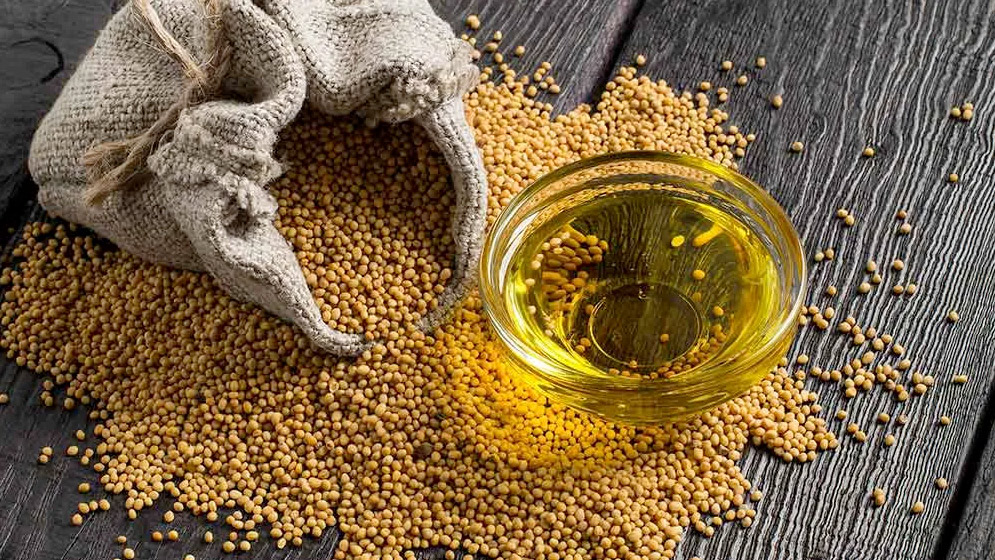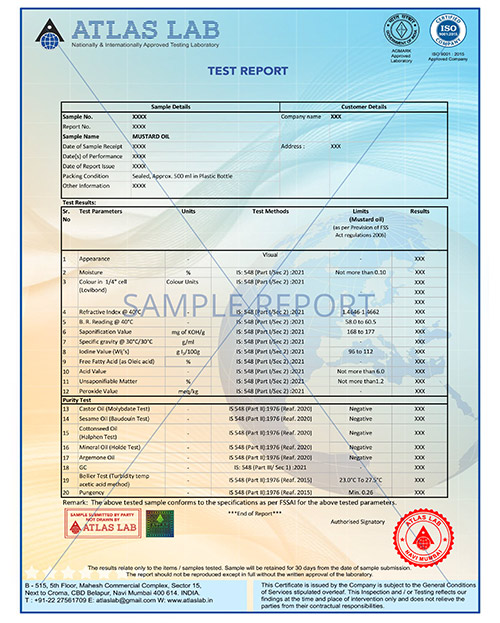From the Lab to the Table: The Journey of Mustard Oil Testing

“I am in search of a reliable and accredited mustard oil testing lab near me to verify the quality and purity of the mustard oil I have purchased!” Well, there’s no reason to worry! Atlas Lab is a one-stop solution for all your edible oil testing needs.
A taste-enhancer and health-booster: Edible Mustard Oil

Edible mustard oil is a type of vegetable oil, with a distinct, pungent flavour; extracted from mustard seeds. It is extracted from the seeds of brown, black or white mustard plants. The seeds are ground, heated and then pressed, to extract the oil. Owing to its dominant flavour and ability to withstand high temperatures, mustard oil is commonly used in cooking and food preparation. It can also be used for frying, sautéing and pickling. It is mainly used in curries, stir-fries and marinades or can be used as a condiment in the form of mustard sauce or paste. Mustard oil is rich in fatty acids like Omega 3, Omega 6, antioxidants, and Vitamin E. It also has anti-bacterial and anti-fungal properties.
Why adulteration of mustard oil should not be ignored.
Potential Health Risks:
When mustard oil is mixed with cheap vegetable and mineral oils or in some cases even non-edible oils, it can pose as a serious health threat. It can cause digestive issues, vomiting, abdominal pain and in severe cases, organ damage.
Reduced Nutritional Value:
Adulteration of mustard oil can affect levels of monosaturated and polysaturated fats, omega-3 acids and antioxidants. The mixing of other substances can deprive consumers of the health benefits that mustard oil has to offer.
Allergic Reactions:
The adulterants added to mustard oil can trigger serious allergic reactions in those who are sensitive or allergic to these substances. Symptoms of such allergies can range from mild rashes to itching to severe reactions, which can be life-threatening.
Contamination with Toxins:
Toxins such as pesticides or heavy metals in mustard oil can have long-term health effects. The prolonged consumption of contaminated oil can lead to organ damage, brain disorders, blood contamination and a risk of cancer.
Legal Consequences:
Adulteration of mustard oil can prove to be a serious violation of food safety regulations. It can lead to heavy fines and even imprisonment.
Why is Mustard Oil Testing a safe and credible step and what are its benefits?
Guarantee of Quality
Mustard oil testing ensures that the oil meets the necessary quality standards. It helps to identify any sort of pollutants, contamination or impurities present in the oil. This is critical for maintaining the safety and authenticity of the product.
The Pungency Test
Pungency refers to the spicy or hot taste and aroma that mustard possesses. The pungency test for edible mustard oil typically involves sensory evaluation by tasting the oil to assess its spiciness and pungent flavour. Here are a few simple steps you can take to assess the level of pungency in the edible mustard oil sample:
Take a small amount of mustard oil in a spoon or dip a finger into the oil.
Allow it to coat your tongue and mouth. Pay attention to the sensation and flavour. Mustard oil should have a distinct and sharp spicy taste.
Assess the intensity of pungency. It can range from mild to strong. Note any lingering heat or aftertaste.
The pungency test helps ensure that the oil meets the necessary sensory attributes, helps consumers choose the mustard oil that aligns with their taste preferences, helps home cooks select the appropriate mustard oil for specific recipes and allows regulatory authorities to identify if the oil has been diluted with other oils.
Allyl Isothiocyanate Test
Allyl Isothiocyanate is a compound found naturally in mustard oil. Its presence in the oil is an indicator of the oil's authenticity and purity. The AITC test involves adding a specific reagent, usually silver nitrate, to the mustard oil sample. If the oil is pure and authentic, it will produce a characteristic yellow precipitate due to the reaction between AITC and silver nitrate. By confirming the presence of AITC, the test helps prevent adulteration, ensures consumer satisfaction, and promotes compliance with regulatory standards.
The Erucic Acid Test
The erucic acid content test for edible mustard oil involves quantifying the amount of erucic acid present in the oil.
Here's a general outline of the testing process we conduct at Atlas Lab:
Sample preparation: We obtain a representative sample of the edible mustard oil that needs to be tested.
Laboratory analysis: The sample is sent to our qualified laboratory equipped to perform fatty acid analysis as a part of the mustard oil test.
Extraction: Our laboratory technicians at Atlas Lab extract the fatty acids from the mustard oil sample. This step involves separating the different fatty acids present in the oil, including erucic acid.
Analysis: The extracted fatty acids are then analysed using Gas Liquid Chromatography (GLC) at our mustard oil testing lab. The technique separates the individual fatty acids based on their unique physical and chemical properties.
Quantification: The erucic acid content is determined by measuring the peak area or peak height of the specific erucic acid peak in the chromatogram and comparing it to a calibration curve prepared using standard samples with known concentrations of erucic acid. This is a crucial step in the mustard oil testing procedure.
Reporting: Our laboratory at Atlas Lab provides a report detailing of the erucic acid content in the tested mustard oil sample.
This is the most accurate methodology in evaluating the erucic acid in the mustard oil testing procedure.
Consumer Safety
Since mustard oil is used vastly across different cultures, its safety is of utmost importance. The mustard oil test helps to identify harmful substances like pesticides, heavy metals or other scums that may be present in the oil. Regular testing ensures that consumers are not exposed to any health risks and the oil they are consuming is absolutely safe.
Compliance with Regulations
Just like any other edible oil, Mustard oil is subject to certain regulations and standards set by food safety authorities in different countries. Testing helps to comply with these regulations, which include composition standards, permissible limits of contaminants, labelling requirements etc.
Traceability and supply chain management
A reliable mustard oil test helps in tracing the origin and authenticity of the oil. It helps with preventing mislabelling or any other fraudulent practices in the supply chain and ensures that the oil comes from reliable sources.
Shelf-life Determination
By accessing its chemical composition and stability, testing can help determine the shelf life of mustard oil. This information is crucial for distributors and manufacturers to arrange for proper storage conditions and to set the expiry dates for the oil.
Product Consistency
The mustard oil test plays a crucial role in upholding product consistency. By inspecting and analysing various parameters such as colour, composition, aroma, fatty acids and other sensory attributes, manufacturers can ensure that each batch of oil meets the desired specifications and maintains its characteristic flavour and aroma.
Why Atlas Lab is your trusted partner for all your mustard oil testing needs
Atlas Lab has its own mustard oil testing lab that offers a highly accurate, reliable and state-of-the-art testing and analysis program. We employ advanced analytical techniques and equipment to assess quality, composition, blending evaluation and other crucial factors. Our tests ensure that the right blend vis-à-vis the blend is supplied and that there is no adulteration or contamination. Our standardized mustard oil testing procedure validates if our edible mustard oil meets the technical and environmental requirements of national and international standards, both.
What are the various tests for Edible Oil carried out by Atlas Lab for mustard oil analysis?
Full Test as per FSSAI / PFA / BIS. The various tests conducted by Atlas Lab are Appearance, Moisture, Colour in 1/4" cell (Lovibond), Refractive Index @ 40°C, B. R. Reading @ 40°C, Saponification Value, Specific gravity @ 30°C/30°C, Iodine Value (Wij’s), Free Fatty Acid (as Oleic acid), Acid Value, Unsaponifiable Matter, Peroxide Value, Castor Oil (Molybdate Test), Sesame Oil (Baudouin Test), Cottonseed Oil (Halphen Test), Mineral Oil (Holde Test), Argemone Oil, GC, Bellier Test (Turbidity temp acetic acid method), Pungency, Gas Liquid Chromatography (GLC) for estimation of Fatty Acids, Saturated and Unsaturated Fatty Acids, Monounsaturated Fatty Acids, Polyunsaturated Fatty Acids, Trans Fatty Acids, Omega – 3, 6 & 9.
Shelf Life – Due to their susceptibility to oxidation from exposure to oxygen, heat and light, resulting in the formation of oxidation products, such as peroxides and hydroperoxides, plant oils rich in polyunsaturated fatty acids have a limited shelf-life. At Atlas Lab, we make sure that the mustard oil has a good shelf life and that we can sustain its quality over an extended period.
The mustard oil testing procedure at Atlas Lab builds consumer confidence, facilitates product improvement, and makes edible mustard oil safe for consumption.




